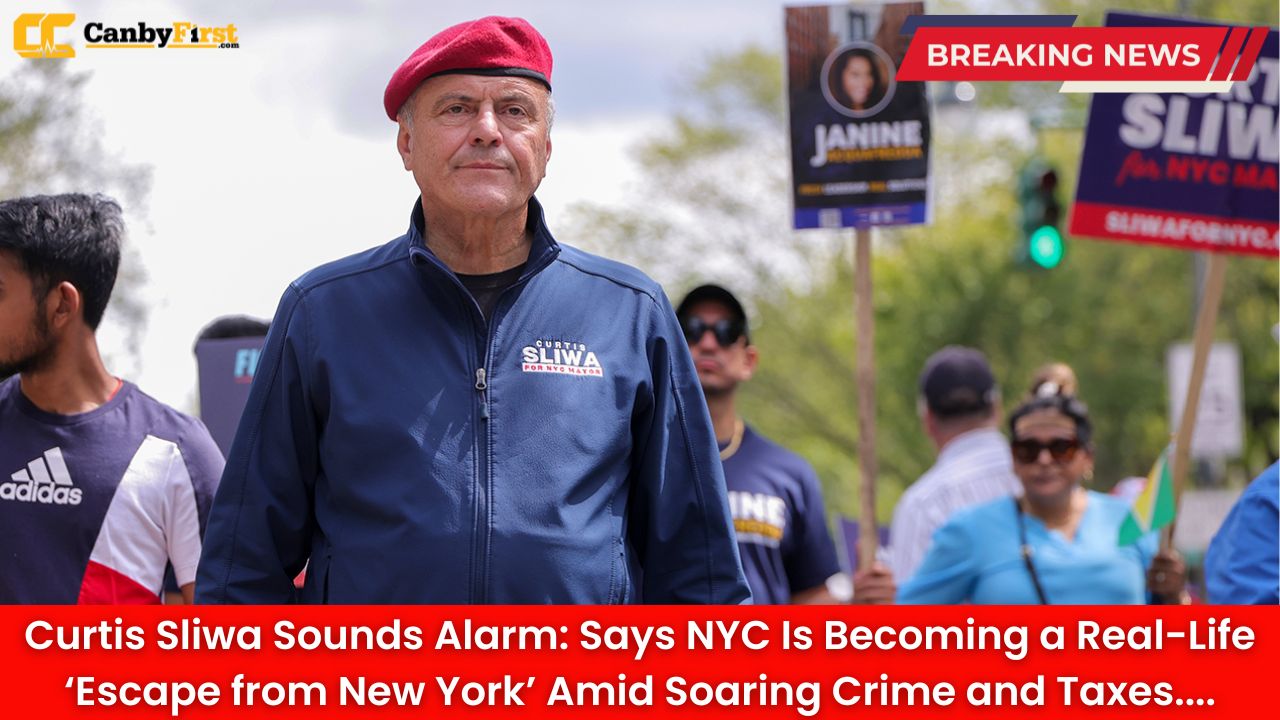New York, US:
As the founder of the Guardian Angels, Curtis Sliwa has never been shy about calling out what he sees as New York City’s decline. But his latest warning has sparked a citywide conversation — and a growing sense of unease. Sliwa claims New York is fast becoming the real-life version of Escape from New York, the 1981 dystopian film set in a crime-ridden, walled-off Manhattan turned prison.
“We’re Living the Movie,” Sliwa Says
Speaking during a community safety forum in Brooklyn, Sliwa told residents that rising crime, chronic homelessness, and what he called “taxation without rational governance” are driving away both business owners and middle-class families.
Also Read
“New York City is descending into chaos,” Sliwa said to a packed crowd. “It’s not science fiction anymore — it’s the Escape from New York sequel playing out in real time.”
The long-time activist and former mayoral candidate, dressed in his signature red beret, accused city and state leaders of ignoring the “crumbling social order” that he believes is turning the city into “a danger zone.”
Alarming Statistics Stir Concern
Although overall violent crime has seen marginal fluctuations, recent months have brought high-profile incidents that have shaken public confidence. Reports of random assaults, organized retail theft, and continued challenges in the subway system have reignited debates about public safety.
Residents in several boroughs, particularly Manhattan and the Bronx, say they feel a growing sense of lawlessness. Surveys show a steep rise in the number of New Yorkers considering leaving the city, with safety concerns and high living costs cited as key reasons.
City officials, however, argue that the media exaggerates the crime narrative. The mayor’s office maintains that targeted policing and neighborhood programs are improving safety outcomes, but Sliwa insists the efforts are “too little, too late.”
The Tax Burden and Exodus Worries
Beyond crime, Sliwa warns that mounting taxes — from property levies to business surcharges — are pushing residents and small enterprises to the brink.
“The people who built this city are moving out,” he declared. “The middle class, the small business owners, the cops, the nurses — they can’t carry the tax load anymore.”
Economic analysts echo some of Sliwa’s worries, noting a steady stream of relocations to lower-tax states like Florida and Texas. Manhattan’s commercial districts, still recovering from the pandemic downturn, have yet to reach pre-2020 footfall levels.
Comparing Fiction to Reality
In John Carpenter’s Escape from New York, Manhattan is sealed off as a maximum-security prison after crime spirals out of control. Sliwa’s comments drew sharp imagery of that cinematic chaos, implying that parts of modern-day New York are heading down a similarly grim path — minus the walls.
Social media lit up following Sliwa’s remarks. Some accused him of hyperbole and fearmongering, while others agreed that the city feels increasingly unsafe. One Brooklyn resident posted, “When the guy who’s spent 40 years walking these streets says something’s off, maybe we should listen.”
Political Overtones and Policy Friction
Sliwa’s remarks come amid mounting tension between city leadership and grassroots safety advocates. The administration has touted investments in mental health outreach, police recruitment, and subway patrols. Critics counter that the policies focus more on image management than real improvement.
Political observers say Sliwa’s comments may be a preview of a renewed push for public safety reforms — or even another potential mayoral run. His message resonates with parts of the electorate frustrated by what they see as government inertia and high living costs driving residents away.
City Hall Responds
In response to Sliwa’s warning, a spokesperson for City Hall said, “New York is far from the dystopia some describe. Crime is trending downward in key categories, and we continue to make record investments in safety and affordability. Fear does not build a city — commitment and action do.”
That statement, however, hasn’t eased anxiety among New Yorkers like taxi driver Anthony Ruiz, who said, “Every day I see fights, I see people struggling, stores closing. It doesn’t feel like the New York I grew up in.”
The Cultural Flashpoint
Sliwa has leaned into cultural references before to make his point, but this one seems to have struck a particular nerve. The phrase Escape from New York has since become a trending topic in local discussions, barbershops, and radio talk shows.
His critics accuse him of dramatizing the situation for political gain, yet even some detractors concede that frustration over street disorder, untamed costs, and slow government response is palpable throughout the city.
A City at a Crossroads
New York stands at what Sliwa calls “a tipping point.” As crime perception clashes with statistical reality, and as the cost of living continues to surge, residents are questioning what kind of city New York will become in the next decade.
“We can’t keep pretending everything’s fine,” Sliwa told reporters. “If we don’t reclaim safety and affordability, this city will turn into exactly what that movie warned us about — an island people flee from, not come to.”
A Call for Balance
Urban analysts say the city’s challenge lies in finding a balance between security, social progress, and economic vitality. Crackdowns alone, they argue, won’t restore New York’s vibrancy if affordability and opportunity remain out of reach for average citizens.
For now, Sliwa continues to make his rounds through borough neighborhoods, speaking with residents and urging volunteer patrols to “take back our streets.” Whether his warnings prove prophetic or just political theater, they have undeniably touched a nerve in the city that never sleeps.
FAQ
Who is Curtis Sliwa?
Curtis Sliwa is the founder of the Guardian Angels, a volunteer crime prevention group formed in 1979. He is also a radio host and former mayoral candidate.
What is Escape from New York?
It’s a 1981 science-fiction film directed by John Carpenter, portraying Manhattan as a walled prison after a collapse of law and order.
What prompted Sliwa’s remarks?
He spoke at a Brooklyn safety forum, criticizing rising crime rates, homelessness, and high taxes under current city policies.
How has City Hall reacted?
Officials defended their record on public safety and affordability, arguing that crime data is improving and that pessimistic comparisons are exaggerated.
What do residents think?
Opinions are divided. Some agree with Sliwa’s grim assessment, while others believe the rhetoric inflates problems that are already being addressed.












